Table of Contents
Home / Use Case /
Diverse Tokenization Use Cases Across Industries

Tokenization is reshaping industries by introducing advanced solutions for asset management, security, and accessibility. By converting physical and intangible assets into digital tokens on a blockchain, tokenization enables fractional ownership, improves liquidity, and ensures transparency across various sectors. For example, tokenization in real estate is transforming property ownership by allowing investors to purchase fractional shares, opening opportunities for smaller investors and facilitating smoother transactions.
In the financial sector, tokenization enhances the trading and management of traditional assets like bonds, equities, and commodities by streamlining processes and ensuring real-time settlements. The art and collectibles market benefits as tokenized assets secure authenticity and enable global trade without the complications of physical ownership.
Tokenization also plays a significant role in supply chain management, providing traceability and authenticity of goods for manufacturers and consumers alike. The healthcare industry uses tokenized data to secure patient information and optimize data sharing. Meanwhile, sectors such as gaming and entertainment utilize tokenization to monetize digital assets and offer innovative business models.
The increasing adoption of tokenization highlights its ability to address unique challenges across industries and deliver tangible value. As blockchain technology continues to evolve, tokenization is set to redefine traditional systems, enabling businesses to adopt more efficient and transparent practices.
This article explores the various use cases of tokenization across industries, showcasing its role in transforming conventional systems and driving growth. But first, let’s understand the basics of tokenization and examine current market trends.
Global Tokenization Market Insights & Statistics
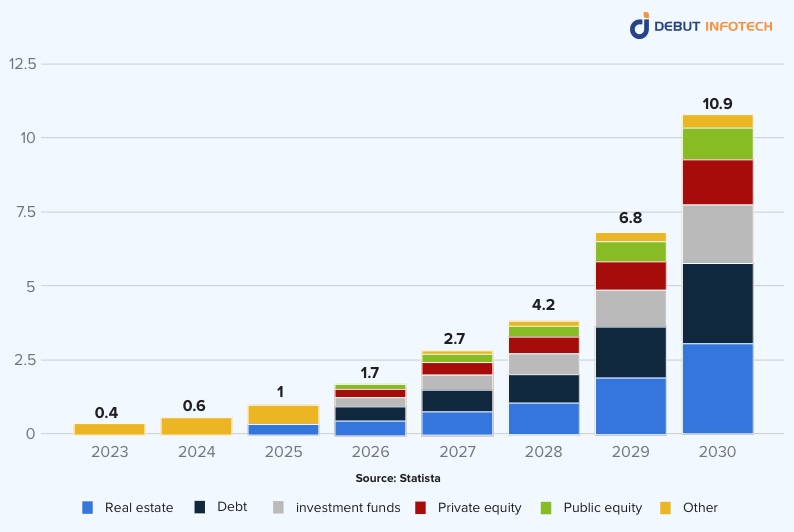
The global tokenization market is witnessing substantial growth as industries increasingly adopt blockchain technology to enhance asset management, security, and accessibility. Tokenization is gaining traction across sectors such as real estate, finance, supply chain, and entertainment, enabling businesses to address challenges like illiquidity, inefficiency, and limited accessibility. This surge reflects the growing recognition of tokenization as a transformative approach for modern businesses.
Here are some key market statistics and trends driving the adoption of tokenization globally:
- According to Fortune Business Insights, the global tokenization market size is projected to reach USD 13.20 billion by 2032, growing at a CAGR of 18.8% from 2023.
- As per the BCG-ADDX Report, asset tokenization is expected to grow into a USD 16 trillion opportunity by 2030, accounting for 10% of the global GDP.
- According to Statista, the tokenized real estate market is forecasted to become the largest type of tokenized asset, taking up nearly one-third of the overall market by 2030.
- As per The Block, Franklin Templeton’s on-chain U.S. Government Money Fund, represented by the BENJI token, holds a 32% market share in the tokenized U.S. Treasuries niche and has $384 million in assets.
Exploring the Core Principles of Tokenization in Modern Businesses
Tokenization is reshaping the way businesses handle assets, secure transactions, and foster innovation. By converting physical and digital assets into blockchain-based tokens, organizations can enhance transparency, reduce costs, and enable broader participation in various sectors. This shift is grounded in a few fundamental principles that guide its implementation and benefits.
These core principles provide the foundation for how tokenization adds value, simplifies processes, and supports businesses in navigating an increasingly complex digital economy.
Key principles of tokenization include:
- Transparency: Ensures all transactions and asset ownership details are recorded on an immutable blockchain, building trust among stakeholders.
- Security: Protects sensitive data and assets through advanced encryption and decentralized systems, minimizing risks of fraud and unauthorized access.
- Accessibility: Democratizes ownership by allowing fractionalization, enabling wider participation in high-value assets like real estate and fine art.
- Efficiency: Streamlines processes by reducing intermediaries, cutting transaction times, and lowering associated costs.
- Liquidity: Increases market liquidity by making traditionally illiquid assets more easily tradable and transferable in global markets.
- Scalability: Supports growth by providing a framework that adapts to various industries and evolving business needs.
- Interoperability: Enables seamless interaction between different systems and platforms, fostering a more connected and efficient ecosystem.
- Compliance: Helps businesses adhere to legal and regulatory requirements by embedding rules and restrictions into tokenized assets.
- Sustainability: Promotes resource optimization and eco-friendly practices by reducing physical processes and fostering digital-first solutions.
Fractionalize Your Assets with Tokenization
Discover how tokenization enables fractional ownership and enhances asset liquidity. Ready to explore tokenized opportunities for your business?
Understanding Tokenization Use Cases Across Key Industries
Tokenization has emerged as a powerful approach to simplify asset management, enhance security, and foster inclusivity in diverse sectors. By converting physical and digital assets into blockchain-based tokens, businesses can streamline ownership, reduce inefficiencies, and unlock liquidity. This innovation not only supports fractional ownership but also provides transparency, enabling organizations to meet evolving regulatory and operational demands.
With its ability to create seamless, secure, and efficient processes, tokenization opens doors to new investment opportunities and global market access. As more industries adopt this transformative technology, tokenization continues to redefine traditional systems, offering businesses a competitive edge in a digitally connected world while addressing unique challenges with scalable and adaptable solutions.
Real Estate: Transforming Asset Ownership
Tokenization in real estate is reshaping the traditional property market by introducing secure, efficient, and accessible methods for property ownership and transactions. By converting property rights into blockchain-based tokens, the process facilitates fractional ownership, enhances liquidity, and simplifies complex real estate operations. It eliminates many of the barriers associated with conventional real estate investments, offering broader opportunities for both large and small investors.
Applications of Tokenization in Real Estate
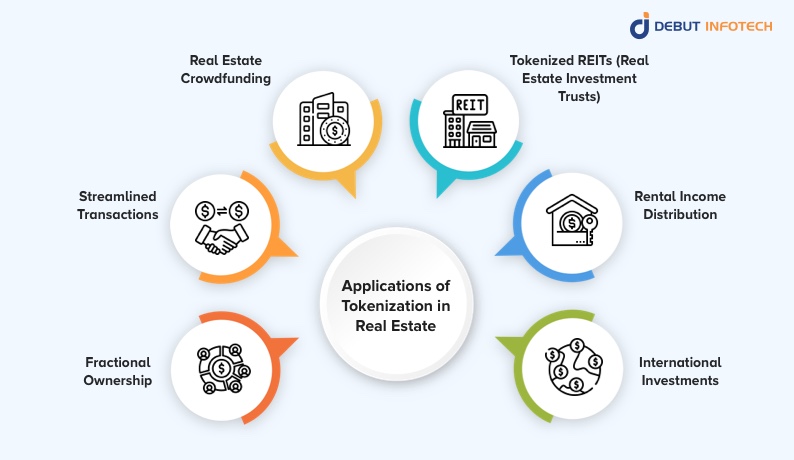
- Fractional Ownership
Tokenization allows a property to be divided into smaller, tradable units. This enables investors to purchase a fraction of high-value assets, such as commercial buildings or luxury homes, without needing significant capital. - Streamlined Transactions
Traditional real estate transactions involve extensive paperwork, intermediaries, and lengthy processing times. Tokenization enables instant and secure peer-to-peer transactions through blockchain networks, reducing time and costs. - Real Estate Crowdfunding
Developers can tokenize projects to attract a diverse pool of investors. By issuing tokens for new developments, real estate companies can raise capital efficiently, ensuring transparency and reducing risks for investors. - Tokenized REITs (Real Estate Investment Trusts)
Tokenization integrates blockchain technology into REITs, providing investors with greater flexibility and liquidity. Unlike traditional REIT shares, tokenized REITs can be traded directly on blockchain platforms, bypassing intermediaries. - Rental Income Distribution
Tokenization of real estate can streamline the distribution of rental income to investors. Tokens representing ownership can automatically trigger smart contracts to allocate revenue based on the percentage of ownership. - International Real Estate Investment
Tokenization eliminates geographical barriers, enabling investors from any part of the world to participate in real estate markets globally. This is particularly beneficial for investors looking to diversify their portfolios without the logistical challenges of traditional property investment.
Further Applications Under Real Estate
- Luxury Properties
High-value properties, such as beachfront villas and penthouses, are being tokenized to attract global investors. This model allows affluent individuals to diversify their portfolios without the challenges of direct ownership.
- Vacation Rentals
Tokenization enables timeshare models where investors can own and trade rights to vacation rentals. This application is particularly popular in tourist hotspots, where properties are in high demand.
- Affordable Housing
Tokenization can be used to fund affordable housing projects by enabling micro-investments. This approach ensures transparency in fund allocation while attracting social impact investors.
- Commercial Real Estate
Office spaces, shopping centers, and warehouses are ideal for tokenization, as they offer consistent rental yields and high value. Tokenization simplifies revenue sharing among multiple investors.
- Distressed Properties
Tokenizing distressed assets allows investors to pool resources for property acquisition and renovation. This approach accelerates turnaround times and creates value for all stakeholders.
- Real Estate Development Projects
Developers can tokenize equity or debt instruments for new projects, enabling them to raise capital without traditional financing challenges. Investors benefit from a transparent and secure process.
Benefits of Real Estate Tokenization
- Accessibility
Tokenization democratizes real estate investment by lowering the entry barriers. Fractional ownership allows smaller investors to participate in lucrative property markets that were previously out of reach.
- Liquidity
Traditionally, real estate is considered an illiquid asset. Tokenization enables real-time trading of property tokens on specialized platforms, allowing investors to buy and sell shares as needed.
- Transparency and Security
Blockchain ensures that all transactions are immutable and verifiable, building trust among stakeholders. Security tokenization further safeguards investor rights and ensures compliance with regulations.
- Cost Efficiency
By automating processes such as title management, ownership verification, and transaction settlement with smart contracts, tokenization reduces the need for intermediaries, significantly cutting costs.
- Global Reach
Tokenization platforms allow real estate assets to be listed on global marketplaces, attracting international investors and increasing the asset’s exposure.
- Efficient Asset Management
Blockchain-based records simplify property management tasks, such as tracking ownership, managing leases, and processing rental payments.
Related Read: Exploring Various Types of Blockchain Tokens
Real-World Examples of Real Estate Tokenization
St. Regis Aspen Resort
The luxury St. Regis Aspen Resort in Colorado was tokenized, with shares sold to investors as security tokens. This project enabled fractional ownership of the resort, providing a liquid alternative to traditional hotel investments.
Brickblock
Brickblock, a blockchain-based platform, tokenized a real estate property in Germany, allowing investors to purchase shares using cryptocurrencies. This project demonstrated the seamless integration of tokenization into international property markets.
Harbor
Harbor, a blockchain-based tokenization platform, enabled the tokenization of a $20 million student housing complex. This project allowed investors to purchase tokens representing fractional ownership of the property, enhancing investment flexibility.
Tokenize Real Estate for Broader Investment Access
Enable fractional ownership, streamline transactions, and attract global investors with real estate tokenization. Looking to revolutionize property investments?
Finance and Banking: Reshaping the Financial Landscape
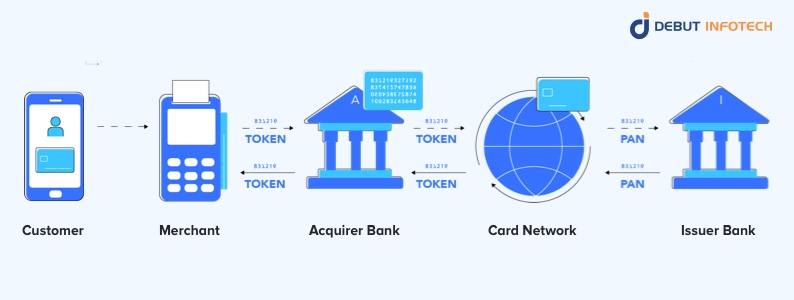
Tokenization is transforming the finance and banking sectors by enabling secure, efficient, and transparent management of assets and transactions. By converting traditional financial instruments into blockchain-based tokens, tokenization simplifies processes, enhances liquidity, and provides new opportunities for both institutions and individual investors. It addresses inefficiencies in the traditional financial system and opens pathways to innovative solutions that drive growth and inclusion.
Applications of Tokenization in Finance and Banking
- Payment Tokenization
Payment tokenization replaces sensitive payment information with secure tokens, ensuring the safety of transactions. This prevents unauthorized access to customer data during credit card transactions or online payments. Banks and fintech platforms are leveraging payment tokenization to combat fraud and align with regulatory standards.
- Security Tokenization
Security tokens represent ownership in traditional assets such as stocks, bonds, or real estate. These tokens enable fractional ownership, providing investors with access to high-value assets without requiring large capital. Security tokenization also reduces intermediaries, cutting costs and streamlining trading.
- Debt Tokenization
Tokenizing debt instruments like loans and mortgages simplifies their trading and management. Fractionalized debt tokens allow investors to participate in debt markets with smaller investments, enhancing liquidity and diversification.
- Tokenization of Funds
Fund tokenization converts shares of mutual funds, ETFs, or hedge funds into digital tokens, making them more accessible and tradable. Investors can purchase tokens representing fund shares, facilitating real-time transactions and global access.
- Tokenization in Fintech
Fintech companies are utilizing tokenization to create innovative financial products and services. From peer-to-peer lending platforms to crowdfunding projects, tokenization offers transparency, security, and efficiency in digital financial ecosystems.
- Tokenization in Banking
Tokenization in banking secures sensitive customer data and ensures compliance with privacy regulations like GDPR. Tokenization also supports seamless cross-border payments, reducing processing times and fees.
Further Applications Under Finance and Banking
Cross-Border Payments
Tokenization facilitates instant, low-cost international transactions by replacing traditional systems with blockchain technology. This is particularly useful for remittances and global trade.
Asset-Backed Tokenization
Assets like gold, commodities, and real estate can be tokenized to create liquid financial instruments. Gold tokenization, for example, allows investors to trade gold-backed tokens without the need to store physical gold.
Tokenized Rewards Programs
Banks and financial institutions can tokenize loyalty rewards, allowing customers to trade or redeem points on blockchain platforms. This enhances customer engagement and flexibility.
Tokenization for Insurance
Insurance companies can use tokenization to manage claims, ensuring transparency and reducing fraud. Policyholders can also access insurance coverage through fractionalized tokens.
Benefits of Tokenization in Finance and Banking
Accessibility
Tokenization democratizes access to financial markets, enabling smaller investors to participate in high-value assets like bonds and mutual funds.
Liquidity
Tokenized assets can be traded 24/7 on global platforms, enhancing liquidity and reducing reliance on traditional markets.
Security and Compliance
Tokenization ensures data security through encryption and aligns with regulatory standards, safeguarding customer information and financial transactions.
Cost Efficiency
By reducing the need for intermediaries, tokenization lowers transaction costs and improves the efficiency of financial processes.
Transparency
Blockchain-based tokenization provides a clear record of transactions, building trust among stakeholders and minimizing disputes.
Global Reach
Tokenization allows seamless access to global financial markets, enabling cross-border investments and transactions.
Real-World Examples of Tokenization in Finance and Banking
- Swiss Digital Exchange (SDX)
The Swiss Digital Exchange offers tokenized securities, enabling the trading of digital assets. This platform provides a fully regulated environment, allowing investors to trade tokenized bonds and equities securely.
- JPM Coin by JPMorgan
JPMorgan’s tokenized currency, JPM Coin, facilitates instant payments and settlements for institutional clients. It exemplifies how tokenization is being integrated into traditional banking processes to enhance efficiency.
- FUSANG
FUSANG, an Asian digital securities exchange, provides a platform for trading tokenized securities and bonds. It enables cross-border trading while ensuring regulatory compliance.
Healthcare: Enhancing Security and Efficiency
Healthcare tokenization is addressing critical challenges in data privacy, security, and accessibility. By converting sensitive healthcare data and assets into secure blockchain-based tokens, tokenization enables seamless sharing, compliance with regulations, and efficient management of resources. This technology ensures patient-centric care while reducing administrative inefficiencies and costs.
Applications of Tokenization in Healthcare
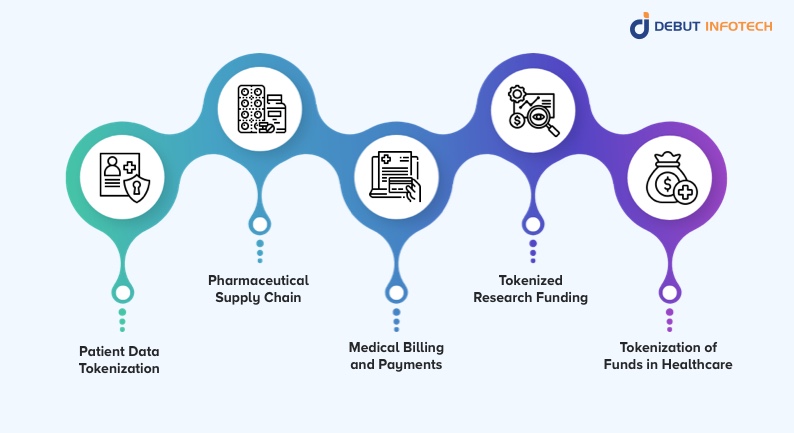
- Patient Data Tokenization
Tokenization of patient records ensures that sensitive data is secure and accessible only to authorized personnel. This approach enables efficient sharing of electronic health records (EHRs) between healthcare providers while maintaining confidentiality.
- Pharmaceutical Supply Chain
Tokenization enhances transparency in the pharmaceutical supply chain by tracking drugs from manufacturing to delivery. This reduces counterfeit drugs and ensures patient safety.
- Medical Billing and Payments
Payment tokenization secures healthcare transactions by replacing sensitive billing information with tokens. This prevents fraud and streamlines payment processes for providers and insurers.
- Tokenized Research Funding
Tokenization allows fractional ownership of research projects, enabling investors to fund healthcare innovations. This approach enhances transparency and accelerates medical advancements.
- Tokenization of Funds in Healthcare
Healthcare organizations can tokenize funds to attract investors for projects such as hospital expansions or infrastructure development. This model ensures accountability and efficient use of resources.
Further Applications Under Healthcare
Clinical Trials
Tokenization secures clinical trial data, ensuring transparency and preventing data manipulation. Participants can also receive tokenized incentives for their contributions.
Healthcare Equipment Leasing
Hospitals can tokenize medical equipment ownership, allowing multiple parties to share resources efficiently.
Telemedicine
Tokenization supports secure transactions and data sharing in telemedicine platforms, ensuring trust between patients and providers.
Insurance Claims
Smart contracts integrated with tokenization streamline the processing of insurance claims, reducing delays and fraud.
Benefits of Tokenization in Healthcare
Data Security
Tokenization protects patient and organizational data from breaches and unauthorized access.
Transparency
Blockchain ensures a clear and immutable record of transactions and data sharing.
Efficiency
Tokenization reduces administrative overheads by automating processes such as billing and claims.
Compliance
Tokenization aligns with healthcare regulations like HIPAA, ensuring secure and compliant operations.
Cost Savings
By reducing fraud and inefficiencies, tokenization lowers operational costs for healthcare organizations.
Real-World Examples of Tokenization in Healthcare
- MediLedger Network
The MediLedger Network uses blockchain and tokenization to enhance drug traceability in the pharmaceutical supply chain, ensuring compliance and safety.
- Solve.Care
Solve.Care utilizes tokenized solutions to streamline healthcare administration and patient payments, improving overall efficiency.
- BurstIQ
BurstIQ tokenizes healthcare data to create secure and interoperable records for patients and providers, enabling efficient data sharing and management.
Supply Chain & Logistics: Improving Transparency and Efficiency
Tokenization in supply chain and logistics is revolutionizing the way goods and services are tracked, verified, and delivered. By converting physical assets and data into secure blockchain-based tokens, this technology ensures transparency, authenticity, and seamless operations. It addresses critical challenges like fraud, inefficiency, and lack of traceability, enabling businesses to optimize workflows and build trust with stakeholders.
Applications of Tokenization in Supply Chain and Logistics
1. Product Traceability
Tokenization ensures end-to-end visibility by assigning unique digital tokens to goods. These tokens record every step of the product’s journey on the blockchain, from manufacturing to delivery. This enables stakeholders to verify the authenticity and condition of products in real-time.
2. Authenticity Verification
High-value goods, such as luxury items or pharmaceuticals, can be tokenized to authenticate their origin and prevent counterfeiting. Blockchain-backed tokenization ensures that consumers receive genuine products.
3. Supply Chain Financing
Tokenizing invoices, purchase orders, or goods in transit allows companies to secure financing more efficiently. By using tokenized assets as collateral, businesses can improve liquidity and reduce reliance on traditional funding methods.
4. Inventory Management
Tokenized systems streamline inventory tracking by digitizing assets, reducing errors, and ensuring timely updates. This is especially valuable for businesses managing complex supply chains with multiple touchpoints.
5. Cross-Border Logistics
Tokenization simplifies international trade by digitizing shipping documents, automating customs clearance, and ensuring regulatory compliance. This reduces delays and enhances efficiency in cross-border operations.
6. Waste Reduction
By tokenizing surplus goods or raw materials, companies can create secondary markets where unused inventory can be traded or recycled, promoting sustainability and reducing waste.
Further Applications Under Supply Chain and Logistics
Fleet Management
Tokenization helps manage fleets by tracking vehicle performance and maintenance schedules. This ensures efficient use of resources and minimizes downtime.
Cold Chain Logistics
Tokenized solutions monitor temperature-sensitive goods, such as vaccines or perishable foods, ensuring they are stored and transported under the right conditions.
Smart Contracts for Shipping
Smart contracts automate processes such as payment release upon delivery, ensuring transparency and eliminating disputes.
Supplier Management
Tokenization provides a verifiable history of supplier performance, enabling businesses to choose reliable partners and maintain quality standards.
Benefits of Tokenization in Supply Chain and Logistics
Transparency
Blockchain-backed tokenization ensures complete visibility, reducing fraud and building trust among stakeholders.
Efficiency
Automating processes like document verification and inventory tracking saves time and reduces costs.
Security
Sensitive data and transactions are protected with encryption, ensuring that supply chain information is tamper-proof.
Sustainability
By reducing waste and enabling resource optimization, tokenization supports environmentally friendly practices.
Global Reach
Tokenization simplifies cross-border logistics, making international trade more accessible and efficient.
Real-World Examples of Tokenization in Supply Chain and Logistics
1. Everledger
Everledger uses blockchain and tokenization to track the provenance of diamonds, ensuring authenticity and ethical sourcing.
2. IBM Food Trust
IBM Food Trust tokenizes food products to enhance traceability, allowing consumers to track items from farm to table.
3. TradeLens
TradeLens, a blockchain-based platform developed by IBM and Maersk, tokenizes shipping documents to improve efficiency and transparency in global logistics.
Entertainment and Media: Redefining Creativity and Ownership
Tokenization in entertainment and media is transforming how content is created, distributed, and monetized. By converting assets such as music, films, and digital art into blockchain-based tokens, creators can retain greater control, ensure authenticity, and directly engage with their audience. Tokenization introduces new revenue models while addressing challenges like piracy and lack of transparency.
Applications of Tokenization in Entertainment and Media
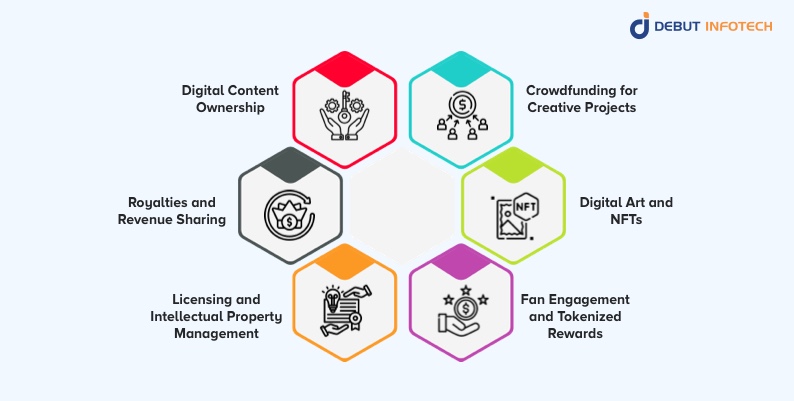
1. Digital Content Ownership
Artists and creators can tokenize their work, such as music albums, films, or photographs, allowing fans to purchase fractional ownership. This ensures creators retain rights while providing investors with a stake in their success.
2. Crowdfunding for Creative Projects
Tokenization enables creators to raise funds for projects by offering tokens that represent a share of future revenue. This democratizes funding, allowing creators to bypass traditional gatekeepers.
3. Royalties and Revenue Sharing
Tokenized assets simplify the distribution of royalties among stakeholders, such as musicians, producers, and distributors. Smart contracts ensure payments are automated and transparent.
4. Digital Art and NFTs
Tokenization has popularized non-fungible tokens (NFTs), which represent ownership of unique digital assets. Artists can sell their work as NFTs, providing buyers with verifiable proof of authenticity and ownership.
5. Licensing and Intellectual Property Management
Tokenized systems simplify licensing agreements by embedding terms in smart contracts. This reduces disputes and ensures creators are compensated fairly.
6. Fan Engagement and Tokenized Rewards
Creators can issue tokens to fans, granting access to exclusive content, merchandise, or events. This strengthens the connection between creators and their audiences.
Further Applications Under Entertainment and Media
Film Tokenization
Producers can tokenize film projects, allowing fans and investors to fund movies in exchange for a share of the profits.
Gaming Assets
In the gaming industry, tokenized in-game assets allow players to buy, sell, and trade virtual goods securely.
Event Ticketing
Tokenized tickets ensure secure and transparent transactions, reducing fraud and enabling resale without scalping.
Collectibles
Tokenization enables the creation and trading of digital and physical collectibles, such as autographs, memorabilia, or limited-edition merchandise.
Benefits of Tokenization in Entertainment and Media
Monetization
Tokenization introduces new revenue streams for creators by enabling direct sales, royalties, and crowdfunding.
Transparency
Blockchain provides an immutable record of transactions, ensuring fair compensation and reducing disputes.
Global Accessibility
Creators can reach a worldwide audience, allowing fans from different regions to invest in and access their work.
Authenticity
Tokenization ensures that digital assets are unique and verifiable, combating piracy and fraud.
Fan Empowerment
Fans can actively participate in a creator’s journey by owning tokens, creating a deeper sense of engagement.
Real-World Examples of Tokenization in Entertainment and Media
1. Kings of Leon’s NFT Album
The band Kings of Leon released their album as an NFT, offering exclusive perks such as concert tickets and limited-edition artwork to token holders.
2. NBA Top Shot
NBA Top Shot tokenized basketball highlights into NFTs, allowing fans to buy, sell, and trade iconic moments.
3. VUELE
VUELE, a blockchain-based platform, offers tokenized films, allowing viewers to own exclusive digital copies of movies and participate in their distribution.
Retail and E-commerce: Driving Innovation and Security
Tokenization in retail and e-commerce is transforming how businesses secure transactions, manage supply chains, and engage with customers. By converting sensitive customer data and assets into blockchain-based tokens, tokenization enhances security, ensures transparency, and simplifies operations. It offers innovative solutions for loyalty programs, payment systems, and inventory management, creating seamless and secure customer experiences.
Applications of Tokenization in Retail and E-commerce
1. Payment Tokenization
Tokenization secures online payments by replacing sensitive payment details with unique tokens. This prevents fraud and data breaches, providing a secure shopping experience for customers.
2. Loyalty Programs
Retailers can tokenize loyalty points, allowing customers to redeem, trade, or transfer them securely. This improves customer engagement and retention while reducing the operational burden of traditional loyalty programs.
3. Supply Chain Transparency
By tokenizing inventory and goods, businesses can track products from manufacturing to delivery. This ensures authenticity, reduces errors, and builds trust among consumers.
4. Tokenized Gift Cards
Blockchain-based gift cards eliminate the risk of fraud and enable customers to transfer or redeem them seamlessly across platforms.
5. Tokenized Digital Coupons
E-commerce platforms can tokenize discount coupons, ensuring secure issuance and preventing misuse.
Further Applications Under Retail and E-commerce
Product Authenticity
Tokenized systems allow consumers to verify the origin and authenticity of high-value goods, such as electronics or luxury items.
Subscription Models
Tokenization enables flexible subscription services, where customers can manage and trade subscription tokens for products or services.
Crowdfunding for Retail Startups
Small retailers can raise funds by tokenizing equity or products, allowing investors to participate in their growth.
Benefits of Tokenization in Retail and E-commerce
Data Security
Payment and data tokenization protect sensitive customer information from breaches.
Transparency
Tokenized supply chains provide verifiable product histories, building consumer trust.
Customer Engagement
Tokenized rewards and programs enhance customer loyalty and satisfaction.
Cost Efficiency
Automation through tokenized systems reduces operational and transaction costs.
Scalability
Tokenization supports global e-commerce by enabling seamless cross-border transactions.
Real-World Examples of Tokenization in Retail and E-commerce
1. Walmart
Walmart uses blockchain tokenization to track food products, ensuring transparency and safety in its supply chain.
2. Starbucks
Starbucks has introduced a blockchain-based tokenized rewards system to provide customers with more flexible loyalty points.
3. Amazon
Amazon is exploring tokenization for secure payment systems and tracking inventory across its vast supply chain.
Energy and Utilities: Empowering Sustainability and Efficiency
The energy and utilities sector is leveraging tokenization to address challenges related to resource management, sustainability, and operational efficiency. By tokenizing energy assets such as solar farms, wind turbines, and carbon credits, the sector is creating a transparent, secure, and efficient system for trading, ownership, and resource allocation. Tokenization introduces a decentralized approach, enabling stakeholders to participate in energy markets without traditional barriers, and fostering innovation and accessibility.
Applications of Tokenization in Energy and Utilities
1. Renewable Energy Projects: Tokenization enables the fractional ownership of renewable energy infrastructure, such as solar panels and wind farms. Investors can buy tokens representing a share in these projects, making it easier for individuals and small businesses to support and benefit from clean energy initiatives.
2. Carbon Credit Trading: Carbon credits are being tokenized to streamline trading and enhance transparency. By representing carbon offsets as blockchain-based tokens, companies can ensure accurate tracking of emissions and compliance with regulatory standards. This approach makes carbon markets more accessible and efficient.
3. Decentralized Energy Grids: Tokenization supports the development of decentralized energy grids, allowing users to trade excess energy generated by renewable sources like solar panels. These peer-to-peer energy trading systems empower individuals to participate actively in energy markets.
4. Infrastructure Financing: Utility companies can tokenize infrastructure projects, such as power plants or grid upgrades, to raise funds from investors. This enables greater financial flexibility and transparency in the allocation of resources.
5. Energy Certificates: Tokenized energy certificates provide proof of origin for renewable energy, ensuring authenticity and allowing consumers to verify that they are purchasing clean energy.
Benefits of Tokenization in Energy and Utilities
Tokenization democratizes access to renewable energy investments, enabling broader participation in sustainability efforts. It ensures transparency in energy trading, reducing fraud and increasing accountability. Smart contracts automate processes such as revenue distribution and compliance reporting, enhancing operational efficiency. Tokenization also promotes resource optimization by enabling precise tracking and allocation of energy assets.
Real-World Examples of Tokenization in Energy and Utilities
1. WePower
WePower tokenizes renewable energy production, allowing users to purchase energy tokens representing specific quantities of clean energy.
2. Power Ledger
Power Ledger facilitates tokenized peer-to-peer energy trading, enabling users to buy and sell excess energy directly.
3. SolarCoin
SolarCoin incentivizes solar energy generation by issuing tokenized rewards for each megawatt-hour produced.
Empower Renewable Energy with Tokenization
Enable fractional ownership of renewable energy projects and streamline trading of energy assets with tokenization. Interested in driving sustainability and efficiency?
Agriculture: Promoting Sustainability and Fair Practices
Tokenization in agriculture is transforming the way resources, goods, and services are managed across the supply chain. By digitizing agricultural assets, such as crops, livestock, and farmland, tokenization ensures transparency, reduces inefficiencies, and promotes sustainable practices. This technology empowers farmers, traders, and consumers to participate in a secure, efficient, and equitable ecosystem.
Applications of Tokenization in Agriculture
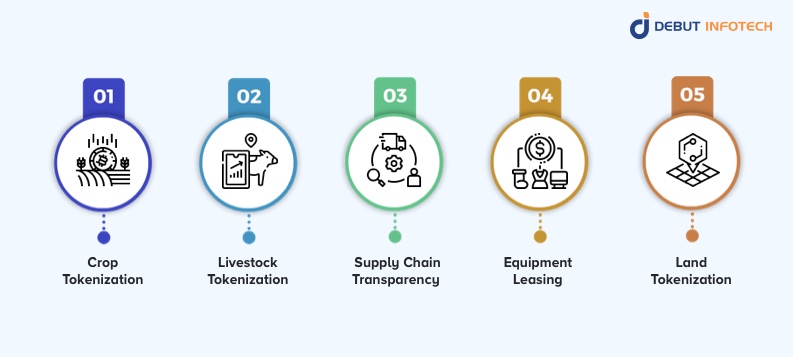
1. Crop Tokenization
Farmers can tokenize their crops, enabling fractional ownership and pre-selling to investors. This approach helps farmers secure funding before harvest while offering investors a stake in agricultural production.
2. Livestock Tokenization
Livestock can be tokenized to create shared ownership models. This allows multiple stakeholders to invest in livestock farming while ensuring fair distribution of profits.
3. Supply Chain Transparency
Tokenized agricultural products provide end-to-end traceability, ensuring authenticity and quality. Consumers can verify the origin and journey of their food, promoting trust and sustainability.
4. Equipment Leasing
Tokenization allows the fractional ownership or leasing of expensive agricultural equipment, enabling small farmers to access advanced machinery without significant upfront costs.
5. Land Tokenization
Farmland can be tokenized to enable fractional ownership, attracting investors to agricultural projects and providing farmers with additional financial support.
Benefits of Tokenization in Agriculture
Tokenization reduces financial barriers, making agriculture more inclusive for small-scale farmers and investors. It enhances transparency across the supply chain, ensuring fair practices and reducing fraud. By enabling pre-sales and decentralized financing, tokenization supports farmers in managing risks and securing resources. Smart contracts automate transactions and agreements, reducing administrative burdens and enhancing efficiency.
Real-World Examples of Tokenization in Agriculture
1. AgriDigital
AgriDigital uses blockchain technology to tokenize agricultural supply chains, providing transparency and efficiency for farmers and traders.
2. GrainChain
GrainChain tokenizes crops to facilitate pre-sales, ensuring fair payments for farmers and secure transactions for buyers.
3. AgriLedger
AgriLedger tokenizes farm produce to enhance traceability and promote fair trade practices across global markets.
Education: Ensuring Secure and Transparent Credentialing
The education sector is adopting tokenization to address challenges in credentialing, student record management, and funding. By converting educational assets and data into blockchain-based tokens, this technology ensures authenticity, reduces fraud, and streamlines administrative processes. Tokenization creates a secure, verifiable system for managing academic achievements and accessing educational opportunities.
Applications of Tokenization in Education
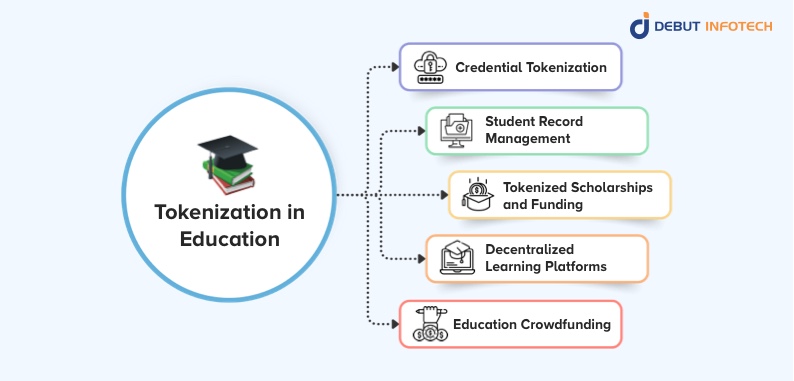
1. Credential Tokenization
Diplomas, certificates, and degrees can be tokenized to create secure, verifiable digital credentials. These credentials can be easily shared with employers and institutions, ensuring authenticity and reducing the risk of fraud.
2. Student Record Management
Tokenization simplifies the management and sharing of student records across schools, colleges, and universities. Blockchain ensures that these records remain secure and tamper-proof.
3. Tokenized Scholarships and Funding
Scholarships can be tokenized to ensure transparent allocation and management. Students can use tokenized funds to pay for tuition and other expenses.
4. Decentralized Learning Platforms
Tokenization supports decentralized platforms where students can earn tokens for completing courses. These tokens can be used to access additional learning resources or exchanged for credentials.
5. Education Crowdfunding
Students can tokenize their future income to raise funds for education, allowing investors to support their studies in exchange for a share of their future earnings.
Benefits of Tokenization in Education
Tokenization reduces administrative inefficiencies by automating processes such as credential verification and scholarship disbursement. It enhances transparency and trust, ensuring fair practices in fund allocation and record management. Blockchain-backed tokenization promotes inclusivity by enabling innovative funding mechanisms and decentralized learning opportunities.
Real-World Examples of Tokenization in Educatio1. Blockcerts
Blockcerts uses blockchain to issue and verify tokenized academic credentials, ensuring secure and verifiable certifications.
2. ODEM
ODEM tokenizes educational achievements, allowing students to showcase their skills to potential employers globally.
3. BitDegree
BitDegree offers tokenized learning incentives, enabling students to earn rewards for completing courses on its platform.
Automotive: Enhancing Ownership, Maintenance, and Trade
Tokenization in the automotive industry is transforming how vehicles are bought, sold, maintained, and even insured. By digitizing assets like vehicles, parts, and service records, tokenization introduces transparency, efficiency, and security to a traditionally complex ecosystem. It simplifies ownership models, optimizes operations, and ensures trust among manufacturers, dealers, and consumers.
Applications of Tokenization in Automotive
1. Vehicle Ownership Tokenization
Tokenization enables fractional ownership of vehicles, allowing multiple parties to share the costs and benefits of car ownership. This is particularly useful for luxury or rare vehicles.
2. Vehicle Trade and Financing
Tokenized systems streamline vehicle sales and financing by automating processes like title transfers and loan agreements, reducing paperwork and processing times.
3. Maintenance Records
Service history and maintenance records can be tokenized and securely stored on blockchain. This ensures accurate, tamper-proof documentation of a vehicle’s condition, which is crucial for resale value and insurance claims.
4. Supply Chain Transparency
Tokenizing automotive components provides end-to-end traceability, ensuring the authenticity of parts and reducing counterfeit issues in the supply chain.
5. Peer-to-Peer Rentals
Tokenization supports decentralized platforms where individuals can rent out their vehicles securely, with smart contracts handling agreements and payments.
Benefits of Tokenization in Automotive
- Transparent Ownership Records: Blockchain ensures tamper-proof records of ownership, enabling secure transfers and boosting trust among buyers and sellers.
- Efficient Vehicle Trade: Smart contracts automate title transfers and financing processes, reducing paperwork and delays.
- Enhanced Maintenance Tracking: Tokenized service records ensure accurate, accessible maintenance histories, increasing resale value and buyer confidence.
- Supply Chain Optimization: Tokenizing automotive parts provides end-to-end traceability, reducing counterfeit risks and improving efficiency.
- Cost Sharing: Fractional ownership models make luxury or specialized vehicles accessible to more investors or users.
- Peer-to-Peer Rentals: Tokenized rental agreements streamline processes, ensuring secure, automated payments and usage tracking.
Real-World Examples of Tokenization in Automotive
1. VINchain
VINchain tokenizes vehicle history records, creating a blockchain-based platform for secure and transparent vehicle data.
2. BMW’s Supply Chain Initiative
BMW leverages blockchain to tokenize and trace automotive parts, ensuring authenticity and efficiency in its supply chain.
3. Daimler’s Mobility Tokens
Daimler issued mobility tokens for car-sharing services, enabling secure and efficient transactions in decentralized mobility solutions.
Telecommunications: Optimizing Data Security and Operations with Tokenization
Tokenization in telecommunications is addressing challenges in data security, customer privacy, and network management. By digitizing sensitive data and operational processes, tokenization ensures secure transactions, compliance, and efficiency across telecom operations. It introduces innovative models for service delivery and monetization, benefiting providers and consumers alike.
Applications of Tokenization in Telecommunications
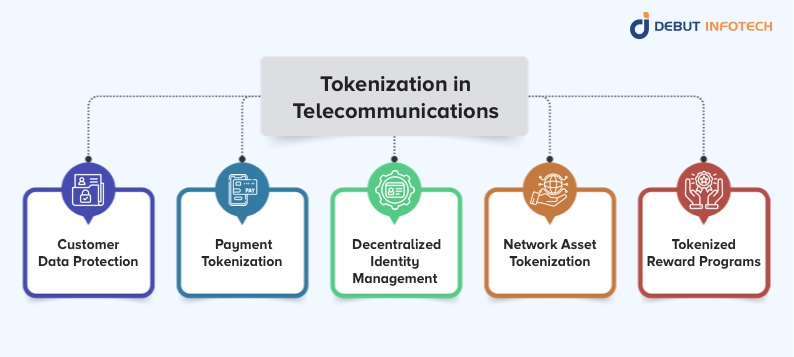
1. Customer Data Protection
Tokenization replaces sensitive customer data, such as phone numbers and billing details, with secure tokens. This prevents unauthorized access and ensures compliance with data protection regulations.
2. Payment Tokenization
Telecom companies leverage tokenization to secure payments, reducing fraud in online and in-app transactions.
3. Decentralized Identity Management
Tokenization supports identity verification processes, enabling secure and seamless user authentication for telecom services.
4. Network Asset Tokenization
Telecom companies can tokenize network assets, such as bandwidth or spectrum, allowing efficient allocation and management.
5. Tokenized Reward Programs
Loyalty points and reward systems can be tokenized, enabling customers to redeem or trade points across multiple platforms.
Benefits of Tokenization in Telecommunications
- Data Protection: Tokenization replaces sensitive customer data with secure tokens, minimizing the risk of data breaches.
- Fraud Reduction: Payment tokenization secures transactions, reducing fraud in online and in-app payments.
- Streamlined Authentication: Tokenized identity systems enable seamless and secure user authentication for telecom services.
- Efficient Resource Management: Tokenizing network assets, such as bandwidth or spectrum, allows optimal allocation and monetization.
- Customer Loyalty Programs: Tokenized rewards offer flexibility, enabling customers to redeem points securely across multiple platforms.
- Regulatory Compliance: Blockchain-backed tokenization ensures transparency and adherence to data protection regulations.
Real-World Examples of Tokenization in Telecommunications
1. Verizon’s Blockchain Initiatives
Verizon has explored tokenization for secure handling of customer data and streamlining supply chain processes.
2. Telefónica
Telefónica uses tokenization to monetize network assets and improve operational efficiency.
3. AT&T Reward Tokens
AT&T integrates tokenized reward systems to offer flexible and secure loyalty programs for customers.
Art and Collectibles: Redefining Ownership and Monetization
The art and collectibles market is experiencing a transformation through tokenization, which digitizes ownership of physical and digital assets. By tokenizing artworks, memorabilia, and other valuable items, creators and collectors can ensure authenticity, facilitate secure trade, and introduce fractional ownership. Tokenization also opens up global markets, allowing broader participation in high-value assets.
Applications of Tokenization in Art and Collectibles
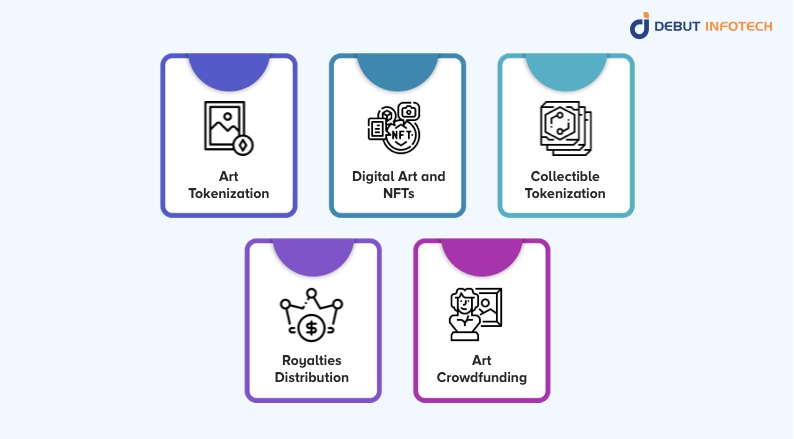
Artists can tokenize their works, offering fractional ownership to investors while retaining control over intellectual property. This model democratizes access to the art market.
2. Digital Art and NFTs
Non-fungible tokens (NFTs) represent unique digital artworks, allowing creators to monetize their work and provide buyers with verifiable proof of ownership.
3. Collectible Tokenization
Memorabilia, such as sports jerseys or autographs, can be tokenized, enabling secure trade and preventing counterfeiting.
4. Royalties Distribution
Tokenized artworks embedded with smart contracts ensure creators receive royalties from future sales, maintaining fair compensation.
5. Art Crowdfunding
Collectors and enthusiasts can invest in tokenized shares of high-value artworks, funding acquisitions collaboratively.
Benefits of Tokenization in Art and Collectibles
- Authenticity Assurance: Blockchain ensures that artworks and collectibles are genuine and traceable, reducing fraud.
- Democratized Access: Fractional ownership models allow more individuals to invest in high-value art and collectibles.
- Global Reach: Tokenized platforms connect creators and collectors worldwide, expanding market opportunities.
- Royalty Automation: Smart contracts embedded in tokenized assets guarantee that artists receive royalties from resales.
- Secure Trading: Tokenized collectibles can be traded seamlessly on blockchain platforms, ensuring secure ownership transfers.
- Crowdfunding Opportunities: Collectors can pool resources to acquire and tokenize rare artworks or memorabilia.
Real-World Examples of Tokenization in Art and Collectibles
1. Beeple’s NFT Auction
Beeple’s digital artwork was tokenized and sold as an NFT for $69 million, showcasing the potential of tokenization in the art world.
2. NBA Top Shot
NBA Top Shot tokenizes basketball highlights into NFTs, allowing fans to trade and collect iconic moments.
3. Maecenas
Maecenas tokenizes fine art pieces, enabling fractional ownership and secure investment opportunities for art enthusiasts globally.
Monetize Art Through Tokenized Ownership
Turn physical or digital art into tokenized assets for fractional ownership and secure global trading. Ready to tokenize your art?
How Can You Start Using Tokenization in Your Business?
Tokenization can truly change the way you manage assets, secure sensitive data, and engage with your customers. By turning physical or intangible assets into digital tokens on a blockchain, it simplifies processes, ensures transparency, and opens new growth opportunities. Here’s how you can get started with tokenization and make it work for your business.
1. Identify Where Tokenization Fits
Start by taking a closer look at your industry and operations. How could tokenization solve existing challenges or make processes more efficient? For example, tokenization of real estate allows fractional property ownership, while finance companies might use tokenization in payments for secure transactions. Think about areas like asset management, customer security, or supply chains where tokenization could deliver real benefits.
2. Look at Real-Life Use Cases
Different industries are using tokenization in unique ways. Real estate firms are enabling fractional property ownership, healthcare providers are securing patient data, and supply chain companies are tracking goods for better transparency. By learning from these real-world applications, you can uncover how tokenization might work for your specific business needs.
3. Boost Security with Tokenization
Tokenization is a powerful way to secure sensitive information. For example, data tokenization can protect customer details, while payment tokenization ensures safe online and mobile transactions. Whether you’re handling confidential data or processing payments, tokenization can help reduce fraud risks and build trust with your customers.
4. Make Asset Management Easier
With tokenization, you can simplify how assets are owned and traded. For instance, commodity tokenization allows fractional ownership of resources like gold, oil, or agricultural products, improving liquidity and accessibility. This can help you expand your market reach and streamline investment opportunities.
5. Improve Supply Chain Transparency
In supply chains, tokenization helps track products from start to finish. It ensures authenticity, reduces counterfeiting, and builds trust with consumers. Whether it’s food, textiles, or high-value goods, tokenizing your supply chain can make operations more reliable and efficient.
6. Offer Fractional Ownership
Imagine making high-value assets, like real estate or luxury goods, available to a wider audience. Tokenization lets you split ownership into smaller parts, allowing more people to invest. It’s a great way to open new opportunities while democratizing access to your products or services.
7. Innovate Fundraising with Tokenization
Tokenization isn’t just about assets—it can also transform how you raise money. For instance, tokenized crowdfunding lets you issue tokens representing ownership or revenue shares. This makes fundraising more transparent and appealing to modern investors.
8. Build the Right Foundation
To make tokenization work, you’ll need the right tools and systems. Start with a secure blockchain platform and integrate features like smart contracts to automate transactions. Collaborating with a tokenization platform development company can help ensure a smooth and tailored implementation process.
9. Start Small, Then Scale
Don’t feel like you need to overhaul your entire business at once. Begin with a pilot project—maybe tokenize one product, property, or process. Use this as a learning experience to fine-tune your approach. Once you see results, you can scale up gradually.
10. Keep Improving Over Time
Tokenization is not a set-it-and-forget-it solution. Regularly monitor your tokenized assets, refine your processes, and stay updated on market changes. By continuously improving, you’ll ensure tokenization keeps delivering value.
Secure Transactions with Blockchain Tokenization
Learn how tokenization ensures transparency and security for digital and physical assets. Interested in safeguarding your business operations?
What Are the Key Steps in the Asset Tokenization Process?
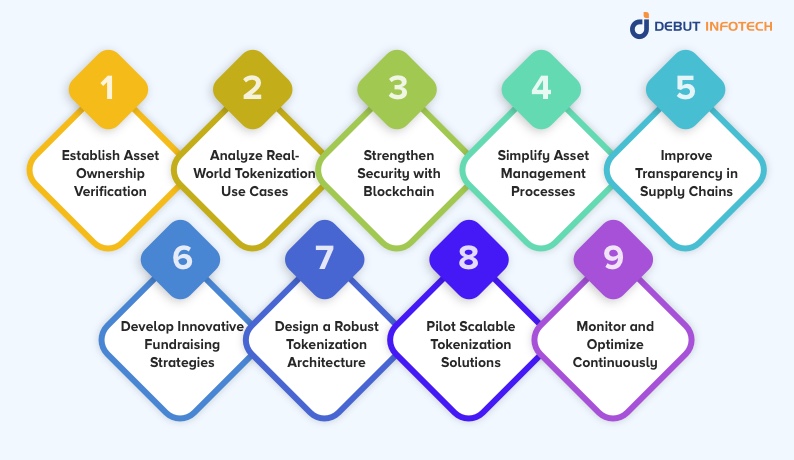
The asset tokenization process involves transforming physical or intangible assets into digital tokens secured by blockchain. This process ensures transparency, enhances security, and facilitates fractional ownership. By following these systematic steps, businesses can leverage blockchain technology to create efficient, scalable, and compliant tokenization solutions that unlock new opportunities and streamline operations.
- Establish Asset Ownership Verification
This step involves confirming the rightful ownership of the asset to ensure authenticity and avoid disputes. Accurate documentation and validation play a crucial role in building trust among stakeholders and regulatory authorities. - Analyze Real-World Tokenization Use Cases
Evaluate existing tokenization applications across industries to identify how they address challenges. This analysis helps businesses determine the best implementation strategies tailored to their operational needs. - Strengthen Security with Blockchain
Integrate blockchain technology to secure sensitive data and ensure tamper-proof records. Blockchain safeguards the integrity of transactions and builds stakeholder confidence through immutable and transparent processes. - Simplify Asset Management Processes
Streamline ownership, trading, and revenue distribution through automation and blockchain-based smart contracts. Simplifying processes reduces intermediaries, minimizes costs, and enhances operational efficiency. - Improve Transparency in Supply Chains
Assign unique digital tokens to goods for tracking their journey from origin to destination. This step boosts consumer trust by ensuring authenticity and providing end-to-end visibility. - Develop Innovative Fundraising Strategies
Create new funding opportunities by tokenizing assets or projects. This allows businesses to raise capital efficiently through models like tokenized crowdfunding or security token offerings (STOs). - Design a Robust Tokenization Architecture
Build a scalable and secure framework to support tokenization processes. A well-designed architecture ensures seamless integration with existing systems while adhering to compliance standards. - Pilot Scalable Tokenization Solutions
Start with small-scale implementations to test tokenization models in real-world scenarios. This helps businesses identify challenges, refine their approach, and ensure a smooth rollout. - Monitor and Optimize Continuously
Regularly evaluate tokenized assets and processes to ensure optimal performance. Continuous monitoring enables businesses to adapt to changing market conditions and improve scalability over time.
How Debut Infotech Can Help You With Tokenization Development Services?
Debut Infotech is a trusted asset tokenization development company, offering end-to-end solutions that help businesses streamline operations, enhance transparency, and unlock new growth opportunities. With extensive experience in tokenization platform development, we specialize in creating tailored blockchain solutions that digitize assets such as real estate, commodities, and digital data, making them secure, accessible, and easily tradable.
Our team of blockchain experts works closely with clients to understand their business needs and design custom tokenization development services that align with their goals. From implementing tokenization in payments to enabling commodity tokenization, we ensure each solution is optimized for security, scalability, and compliance with industry regulations.
At Debut Infotech, we leverage the latest technologies and frameworks to deliver robust tokenization solutions that transform asset management, streamline processes, and enhance market accessibility. Whether it’s developing secure tokenized platforms, enabling tokenization of real estate, or integrating tokenization into existing operations, we provide comprehensive services covering development, deployment, and ongoing support.
By partnering with Debut Infotech, businesses can explore new revenue streams, improve operational efficiency, and achieve a competitive edge in the digital economy through innovative tokenization strategies. Let us help you harness the full potential of blockchain-based tokenization to future-proof your business.
FAQs
RWA tokenization refers to the process of converting real-world assets, such as real estate, commodities, or art, into blockchain-based digital tokens. These tokens represent ownership or value of the physical asset, enabling fractional ownership, improving liquidity, and facilitating secure, transparent transactions for businesses.
Tokenization in banking involves converting sensitive financial data, such as account details or transaction information, into secure tokens. These tokens replace actual data in payment systems, ensuring enhanced security, fraud prevention, and compliance with financial regulations.
A consumer token offering (CTO) is a blockchain-based model where businesses issue utility tokens to customers. These tokens grant access to specific products, services, or benefits within a platform, enabling innovative customer engagement strategies and fostering loyalty.
Real estate tokenization converts property ownership rights into blockchain-based tokens, enabling fractional ownership and secure trading. This approach enhances liquidity, simplifies transactions, and allows businesses to attract a broader range of global investors.
Smart contracts in real estate automate processes like property title transfers, rental agreements, and escrow management. These blockchain-powered contracts eliminate intermediaries, reduce costs, and ensure secure, tamper-proof transactions, streamlining real estate operations for businesses.
Protegrity tokenization secures sensitive business data by replacing it with unique, non-sensitive tokens. This approach protects critical information, ensures compliance with data privacy regulations, and minimizes the risk of breaches in industries like finance, healthcare, and retail.
The future of tokenization will redefine how businesses manage assets, from fractional ownership to enhanced liquidity and global market access. As tokenization trends evolve, businesses can leverage blockchain to improve operational efficiency, security, and scalability, gaining a competitive edge.
Yes, tokenization platforms are highly effective for B2B businesses. They facilitate secure asset management, fractional ownership, and streamlined transactions, providing a scalable solution for enterprises in industries such as real estate, finance, and supply chain.
Security token offerings provide businesses with a compliant and transparent way to raise capital by tokenizing assets like equity, bonds, or real estate. STOs attract institutional and retail investors, offering a secure and efficient fundraising model.
A consumer token offering (CTO) focuses on utility tokens that grant users access to specific products or services. For B2B companies, CTOs can create innovative engagement models, driving customer loyalty and expanding service offerings.
Keeping up with tokenization trends allows businesses to identify emerging opportunities and adapt to technological advancements. Trends like real world asset tokenization and decentralized platforms can help enterprises streamline processes and create new revenue streams.
Tokenization of real world assets enables businesses to fractionalize and trade traditionally illiquid assets like real estate, commodities, or art. This improves market accessibility, enhances liquidity, and opens new opportunities for global investment and growth.
Real estate tokenization cost varies based on factors like property type, platform development, regulatory compliance, and maintenance. Businesses must also consider smart contract integration, platform scalability, and ongoing support expenses.
Asset tokenization companies provide end-to-end solutions, including asset digitization, platform development, and regulatory compliance. They help enterprises implement scalable tokenization strategies that enhance operational efficiency and market access.
Partnering with a real estate tokenization company ensures the implementation of secure, compliant, and efficient tokenization platforms. These companies bring expertise in blockchain and real estate, helping businesses navigate complexities and achieve scalable solutions.
Talk With Our Expert
USA
2102 Linden LN, Palatine, IL 60067
+1-708-515-4004
info@debutinfotech.com
UK
Debut Infotech Pvt Ltd
7 Pound Close, Yarnton, Oxfordshire, OX51QG
+44-770-304-0079
info@debutinfotech.com
Canada
Debut Infotech Pvt Ltd
326 Parkvale Drive, Kitchener, ON N2R1Y7
+1-708-515-4004
info@debutinfotech.com
INDIA
Debut Infotech Pvt Ltd
Sector 101-A, Plot No: I-42, IT City Rd, JLPL Industrial Area, Mohali, PB 140306
9888402396
info@debutinfotech.com
Talk With Our Expert
15+ years in IT
to deliver value that lasts
Over 500 success stories
including Disney, KFC, DocuSign & HDFC Bank
Team of 150 specialists
Web, mobile, Blockchain, AI & ML
Presence across 5 continents
Get Dedicated Account Managers operating in your time-zone.